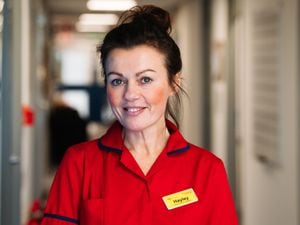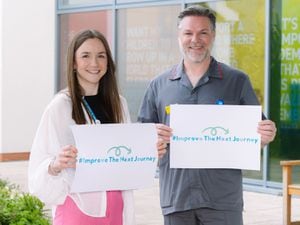Shropshire ambulance campaigner calls for 'flexible' system to tackle delays
An ambulance campaigner and councillor has called for a "flexible" cohort of healthcare staff to support patients being discharged from hospital.

Ludlow county councillor Darren Childs, whose daughter had to wait 37 minutes for paramedics to arrive when she had a seizure scare in January, asked Shropshire Council if it would meet integrated care system (ICS) leaders to explore the possibility, which he believes would fill gaps until long-term arrangements could be put in place.
The ambulance handover delay have become a much-talked about crisis in the county, with long queues of emergency vehicles regularly seen waiting outside Royal Shrewsbury Hospital and Princess Royal Hospital in Telford.
West Midlands Ambulance Service said delays had increased six-fold when comparing April this year to April 2021, and director Mark Doherty pinpointed August 17 as the possible "Titanic moment", when ambulances will not be able to pick patients up.
At a Shropshire Council meeting, Councillor Childs said: "I have learned that the crisis in ambulance response times is the ‘tip of the iceberg’, a symptom of a wider crisis in ‘flow’ across A&E, our acute hospitals in Shrewsbury and Telford, and in social care.
"SaTH (Shrewsbury and Telford Hospital NHS Trust) typically has in the region of 120 patients a day who are fit for discharge but cannot leave hospital. This contributes very substantially to a lack of availability of hospital beds, to the A&Es becoming full, and to ambulances off the road because they are queuing up outside A&Es at RSH and PRH.
"Will Shropshire Council meet ICS leaders again to explore the possibility of joint funding and/or management of a cohort of staff who could be used flexibly to provide routine healthcare and social care to patients being discharged from hospital, filling the gaps until longer-term arrangements can be put in place?
"Can discussion take place on direct employment of staff from a variety of companies across the care sectors to ensure pay and conditions that will support retention? There would of course be a cost – but considerably less than the health and social care system incurs now through failing to achieve timely discharge of patients from hospital.
"If cost is an issue – and I suspect it will be when the council approach Shropshire’s four MPs, and seek their support, as a matter of urgency, in approaching the Department of Health and Social Care and appropriate ministers in an attempt to secure additional funding and also provide the public with updates?"
Councillor Simon Jones, portfolio holder for adult social care and public health, replied: "Shropshire Council's adult discharge performance remains high, with double the number of discharges compared to pre-pandemic years.
"The ICS works alongside partners to provide a range of approaches which support people to avoid unnecessary hospital admission, facilitate timely and safe hospital discharge and adopt an approach to achieve better outcomes and avoid re-admissions into hospital.
"During pressured times we review capacity and our staff often volunteer to do additional hours to support the hospitals and have supported across seven days a week.
"We implemented a number of initiatives to support increased demand in the hospitals. One of our winter projects, for example, led and supported by the voluntary and community services, saw an increase of 60 per cent in referrals based on the previous winter.
"They attended multi-disciplinary meetings, and we are working to support this as we review 'flow' for the upcoming winter. We've continually moved resources from frailty and A&E to support front door discharges.
"We're currently involved in a number of transformation plans across the system, which is a positive platform to improve the patient journey and outcome in the future.
"We are working with Shropshire Partners in Care to look at recruitment and retention. We've done recruitment fairs.
"We hope this provides reassurance that partners are continually looking and working together to look at a system transformation and ways we can align resources and support."





